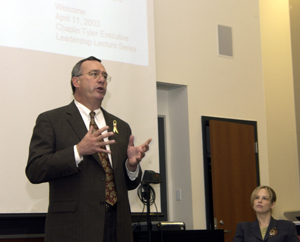|
1:50 p.m., April 14, 2003--Donald Bell, hired less than four years ago to head a company that was facing severe financial difficulties, delivered a bottom-line message to an audience of students, faculty and community members on Friday, April 11:
 |
| Donald Bell, president of Siegfried (USA): “Running a company was the American dream, and it was my dream. I had no idea what I was getting into.” |
“The lesson is that companies can be turned around,” he said. “You can’t give up. If you’re given the opportunity, and you tell somebody you’re going to do it, then you’ve got to do it.”
Bell, who spoke to an overflow crowd in MBNA America Hall, was this semester’s second speaker in the Chaplin Tyler Executive Leadership Lecture Series. Presented by the Alfred Lerner College of Business and Economics, the continuing series brings a variety of speakers to campus to share their professional and personal experiences as leaders of businesses and nonprofit organizations.
Since 1999, Bell has been president of Siegfried (USA), which manufactures active pharmaceutical ingredients at its plant in Pennsville, N.J. The company, a subsidiary of the Swiss-based Siegfried Ltd., was losing money, employees and production capability when Bell was hired to oversee its turnaround.
Today, the company is again profitable. A recent article in the trade magazine Chemical Market Reporter described it as “a phoenix risen from the ashes.”
In his lecture Friday, Bell described the process of reviving the business, originally named Ganes Chemical, as “pure hell” and acknowledged that, when he signed on as president, he never imagined how tough the job was going to be. He said he knew the company had received a warning letter from the federal Food and Drug Administration (FDA) that, unless corrected, would seriously hamper its ability to continue manufacturing its existing products and would prevent it from developing new ones. Still, he said, he expected to turn the company around in about four months.
Instead, as he told those attending the lecture, the next two years saw a series of catastrophic events, beginning with an explosion in the plant—on Bell’s fourth day on the job—that sent three workers to the hospital with severe injuries. He said he also faced problems when two quality-control managers quit, half the employees left for jobs they believed offered more security, environmental regulators fined the plant, a wildcat strike occurred, an IRS audit found questionable accounting practices and Siegfried’s parent company announced contingency plans to sell its U.S. operations if the FDA licensing problems weren’t resolved.
“Be careful what you wish for,” Bell told the audience. “Running a company was the American dream, and it was my dream. I had no idea what I was getting into.”
Despite all the turmoil, Bell said he was able to implement changes that have made the company successful again. Those included formulating a small number of specific goals for the business and communicating them clearly to every employee, ensuring that everyone knew how his or her job related to those goals. He said he also replaced almost all senior managers, instituted a bonus system based strictly on employee performance and communicated openly and honestly with workers, the union and customers.
Bell also credited Siegfried’s Swiss parent company with continuing to invest in the U.S. operation throughout the difficult years in which it was “bleeding cash.”
“I don’t think any U.S. company would have kept us going, but Siegfried did,” he said. “They wanted a foothold in the biggest pharmaceutical market in the world [the American market], and they thought it was worth the investment.”
As a result, he said, when the company’s regulatory and production problems began to be solved, the plant had the equipment and ability to turn a profit again. Today, the company is in full compliance with FDA standards, is manufacturing a reduced number of products and is adding product lines regularly. In 2002, Siegfried (USA) earned a profit on $49 million in sales, Bell said. His long-term goal, he said, is for a 20 percent profit on $100 million in sales in 2005.
Bell said he has learned that, to accomplish a successful turnaround, “You need to build credibility by delivering on your commitments. And, you need to do that over and over and over again.”
Siegfried (USA) sells its pharmaceutical ingredients to small drug companies and to some of the large companies that do not do their own ingredient manufacturing. Because its products don’t carry their own brand name, Bell said, the company is not well-known nationally outside the industry. He described it as “a small company in one of the biggest industries [pharmaceuticals] on the planet.”
In Pennsville, Siegfried has about 225 employees and is one of the largest private employers in Salem County, N.J.
The next lecture in the Chaplin Tyler series will be given May 2 by Alexander F. Giacco, retired chief executive officer of Hercules Inc.
Article by Ann Manser
Photo by Kathy Flickinger
|

